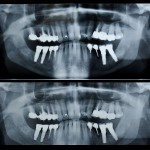
Dental implants are increasingly used to replace a missing tooth or teeth with 5yr-survival rates being reported to be in the 90-95% range. However, peri-implantitis characterised by the inflammation of the peri-implant soft tissue and progressive bone loss which may lead to implant loss has been reported to occur in around 20% (95%CI; 16.6 to 23.7%) of patients (Dental Elf – 24th Oct 2022). Surgical (Dental Elf – 17th May 2023) and non-surgical (Dental Elf – 15th Mar 2023) treatment approaches for peri-implantitis have been used together with supportive care.
The main aim of this review was to assess whether supportive care is effective in preventing recurrence or progression of peri-implantitis.
Methods
A protocol was registered on the PROSPERO database. Searches were conducted in the Cochrane library, Medline/PubMed, the clinical trials database clinicaltrials.gov and the website base-search.net . English language studies reporting on the secondary prevention of peri-implantitis following surgical or non-surgical peri-implantitis treatment were considered. Clinical observational studies with a minimum of 20 patients and ≥3 years were eligible as were comparative studies (randomised controlled trials [RCTs] and controlled clinical trials [CCTs]) with a minimum of 10 patients per treatment arm and at least 3 years were eligible for inclusion.
Two reviewers independently selected studies and abstracted data. The primary outcome measure was peri-implant tissue stability around the implant(s) treated for peri-implantitis measured using one or more of, probing pocket depth (PPD), bleeding on probing (BOP), suppuration on probing (SOP), radiographic marginal bone loss, exposed fixture threads/peri-implant mucosal recession. Secondary outcomes include implant survival (present regardless of surrounding tissue health) and implant loss. Study quality was assessed using a modified Newcastle-Ottawa Scale (NOS).
Results
- 15 studies (10 prospective, 5 retrospective) were included.
- All patients received surgical treatment for peri-implantitis.
- None of the studies was specifically designed to address supportive care protocols so few studies provided detailed information on supportive care regimens.
- No studies reported on outcomes with and without supportive care.
- Definitions for peri-implantitis, treatment success and recurrence of disease varied considerably across the studies.
- Success (as defined by the authors) in studies with a follow-up of 5 years or more ranged from 24.4% to 100% at the patient level and from 28.3% to 73% at the implant level.
- Recurrence of disease ranged from 3% and 69.6% at the patient level and between 2.2% and 65.2% at the implant level.
- No studies reported on patient reported outcomes (PROMs) quality of life or economic factors.
Conclusions
The authors concluded: –
Supportive peri-implant care may result in peri-implant tissue stability after peri-implantitis treatment. However, disease recurrence may require re-treatment or in some cases implant removal. Further studies are necessary to identify the most effective supportive care protocols, the most effective supportive care frequency and the effect of adjunctive antiseptic agents.
Comments
This review was undertaken to address 3 related questions: –
- In patients treated for peri-implantitis what is the efficacy of supportive care in comparison with no supportive care, in terms of peri-implant tissue stability, as reported in prospective and retrospective studies of at least 3-year duration?
- In patients treated for peri-implantitis what is the efficacy of supportive care with adjunctive local antiseptic agents in comparison with supportive care without local antiseptic agents, in terms of peri-implant tissue stability, as reported in prospective and retrospective studies of at least 3-year duration?
- In patients treated for peri-implantitis what is the efficacy of supportive care with a frequency of more than once a year in comparison with supportive care with a frequency of once a year or less in terms of peri-implant tissue stability, as reported in prospective and retrospective studies of at least 3-year duration?
The authors registered their review on PROSPERO. Searches were undertaken in a small number of major database although restriction to publication in English may have excluded some relevant studies. Given that the review was aiming to assess the efficacy of supportive care to prevent recurrence or progression of peri-implantitis none of the included studies were specifically designed to do this. The primary objectives of the studies being the treatment and follow -up of peri-implantitis treatment. A consequence of this is that the supportive care regimens are poorly reported and key elements such as definitions for peri-implantitis, treatment success and recurrence of disease vary across the studies. As a result, the main outcome of this review is to highlight the needs for well conducted and reported randomised controlled trials of appropriate size and duration using commonly agreed definitions to compare different (and well documented) supportive care regimens. Studies should also include patient reported outcomes and economic evaluations.
Links
Primary Paper
Stiesch M, Grischke J, Schaefer P, Heitz-Mayfield LJA. Supportive care for the prevention of disease recurrence/progression following peri-implantitis treatment: A systematic review. J Clin Periodontol. 2023 Jun;50 Suppl 26:113-134. doi: 10.1111/jcpe.13822. Epub 2023 Jun 20. PMID: 37339881.
Other references
Dental Elf – 24th Oct 2022
Dental Elf – 17th May 2023
Dental Elf – 15th Mar 2023
Dental Elf – 29th May 2023
Peri-implantitis – adjunctive measures to non-surgical peri-implant therapy
